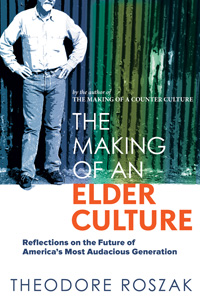In 1989, Theodore Roszak published The Making of the Counter Culture, a book which introduced to the world the Woodstock generation, the summer of love and the summer of political protest. In his latest book The Making of an Elder Culture: Reflections on the Future of America’s Most Audacious Generation. Roszak revisits the generation he defined 40 years ago. This is definitely not a whimsical look at the mad-cap excesses of the hippie generation or a nostalgic visit to the first heady days of sex drugs and rock and roll. The author focuses on the formidable strengths of the baby boomer generation, reminds us of the significant accomplishments of our youth and challenges us to again take up the good fight.
Roszak sees the forming of a productive elder culture within our society not as a passing population bubble which shall pass into history with the last boomer, but rather that older people will become a much larger percentage of the population for the indefinite future. He demonstrates this with a convincing demographic analysis.
Central to the theme of this book is that the idea of “elderly” is reclaimed from the neo-conservative social model which sees the aged as unproductive and a net social burden. From the latter part of the last century the political right in America has tried to paint aging boomers as a looming economic disaster as we selfishly spend the fortune of our grandchildren on our own entitlements. Roszak counters this, and posits a model of the elder more as it is found in the traditional and natural societies where the elderly were the reservoirs of a people’s culture and accumulated wisdom, and a group to be listened to with respect. In fact the boomer generation is described in The Making of an Elder Culture as potentially the vanguard of a potent and permanent social force. In comparing aging boomers to social and revolutionary movements of the 20th century, the author likens the very fact of our longevity as an unplanned and unruled social revolution which is quietly defining the future.
The author sets high expectations, and notes “My hope is that the people who grew up on J.D. Salinger’s Catcher in the Rye, the poetry of Alan Ginsberg, the folk music of Pete Seeger, the protest ballads of Country Joe, the anarchic insolence of the Beatles and the Rolling Stones, the biting satire of Mort Sahl and Lenny Bruce, the acid rock of Bob Dylan, the sociology of Paul Goodman and Herbert Marcuse, the Summer of Love and the Days of Rage, will not be content to spend their retirement years on cruise ships or feeding their Social Security income into slot machines at the nearest casino.”
As a boomer of course I remember all that. Paul Goodman and Marcuse, weren’t they with the Paul Butterfield Blues Band? Or maybe it was the Archies. In my more honest reflections on the youth I shared with so many I recall a generation which was inordinately self absorbed and allowed itself to be the most marketed to group in history. This has only become worse over the years. The same ad agency weasels who sold us everything from Che Guevara t-shirts to hash pipes are still selling Viagra and Depends, and we’re still buying. Roszak has set the bar high for we boomers, but he reminds us of both our economic might and the lofty ideals of our youth.
As an academic of international repute, Roszak has written a thoroughly researched cerebral book, but it is written from the heart and with conviction. It is a hard book to put down, and as an aging boomer I found it to be exciting and optimistic. In some ways perhaps we boomers have fallen short of our great promise, but with The Making of an Elder Culture we are given a second chance.
It would seem that mine is not a generation which will go gently into that good night.–Frank Preyde
Frank Preyde is an unrepentant product of the ’60s, excesses and all, who has never really left his youth. He currently works as a community mental health worker in Toronto where he labours daily at the rockface of the human experience.




